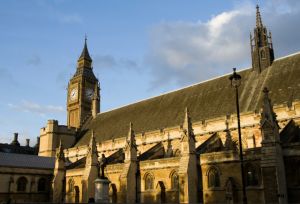 According to The Guardian, officials in the Church of England are being made aware of a desire by some transgendered people to be baptized in the church under the names with which they identify. Most often these are new names that reflect the individual transitions. While response has been mixed, the idea is enjoying growing support on a local level among both laypeople and clergy. The question of whether the church would administer an entirely new baptism, or adopt other measures of confirmation that would acknowledge a person's transition, is likely to be under debate for some time to come.
According to The Guardian, officials in the Church of England are being made aware of a desire by some transgendered people to be baptized in the church under the names with which they identify. Most often these are new names that reflect the individual transitions. While response has been mixed, the idea is enjoying growing support on a local level among both laypeople and clergy. The question of whether the church would administer an entirely new baptism, or adopt other measures of confirmation that would acknowledge a person's transition, is likely to be under debate for some time to come.
Local Requests Lead to National Awareness
Chris Newlands is the vicar of Lancaster Priory. He was recently asked by a transgender male to be baptized under his chosen name. At first, Newland's response was to tell the person that once a soul has been baptized, it is considered baptized for life. After further consideration, however, Newlands began to understand the personal significance of a new baptism for people who are transitioning or who have transitioned. He put in a request to the House of Bishops, asking them to weigh the possibility of nationally accepted liturgical resources that would recognize a parishioner's transition. Consideration of new proposals is a process. The parochial church council, the Deanery Synod and the Blackburn Diocese have accepted the request, but other agenda items may be positioned ahead of the motion and delay the debate.
A Movement Toward Inclusion
Unlike non-Judeo-Christian faiths, Christianity has long held to a position that human beings are divided into male and female genders, with little consideration or acceptance for someone who may identify differently. While some church officials support an expansion of the understanding of the liturgy to include all devoted parishioners, others experience difficulty with the idea that transgender identification goes against the Christian faith. Andrew Symesn of the Anglican Mainstream opposes the idea of new baptisms for transgendered people.
The Christian News quotes Symesn: "We are aware there are a number of people who want to change from one gender to another and that's a new thing for the church to deal with It would be something that would go against the teachings of the church up till now."
Change is in the Wind
The church has also been grappling recently with the concept and practice of female ordination. In January 2015, The Church of England did, in fact, ordain its first woman bishop. The event, however, was not without its detractors. One man shouted out during the ordination, "No! Not in the Bible." The British website God & Politics maintains that while membership in the church has seen a slight decline in the last decades, confirmations are actually up. As of 2010, there were approximately 25 million baptized members of the Anglican Church worldwide. Members are generally associated with one of three parties:
- High church, or Anglo-Catholic
- Low church, or Evangelical
- Broad church, or liberal
Each party holds its own set of general attitudes under the big umbrella of the Church of England. The parties reflect a leaning either toward liturgy that recalls the church's Catholic origins, or toward a more liberal Protestantism. Membership in any given party has swelled and abated at different points in history. The division of philosophies keeps debate about systemic changes to the church alive. While change may be happening on the ground in local parishes, it may take some time before the church as a whole supports new baptisms for its transgender members.
Service in Transition
In the meantime, Newlands is supporting the idea of a new kind of service that, while not technically a baptism, is a way to introduce a person to God with their new name. Newland characterized the ceremony his church held for the person who initially approached him, "A really joyful occasion."
Add Your Comment